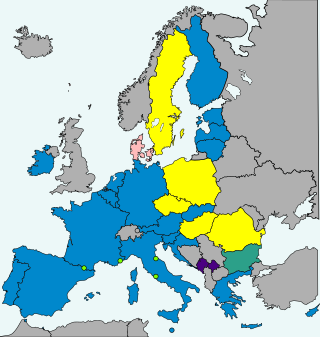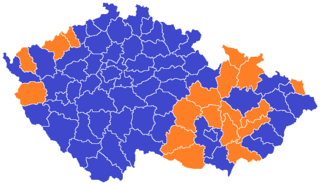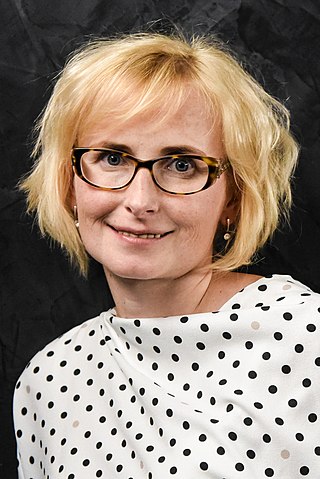Related Research Articles
The 2004 European Parliament election in the Czech Republic was the election of members of the European Parliament (MEPs) representing the Czech Republic for the 2004–2009 term of the European Parliament. It was part of the wider 2004 European election.
The Czech Republic has offered registered partnerships for same-sex couples since 1 July 2006. Registered partnerships grant several of the rights of marriage, including inheritance, the right to declare a same-sex partner as next of kin, hospital visitation rights, jail and prison visitation rights, spousal privilege, and alimony rights, but do not allow joint adoption, widow's pension, or joint property rights. The registered partnership law was passed in March 2006 and went into effect on 1 July 2006. The country also grants unregistered cohabitation status to "persons living in a common household" that gives couples inheritance and succession rights in housing.
Parliamentary elections were held in Czechoslovakia on 26 May 1946. The Communist Party of Czechoslovakia emerged as the largest party, winning 114 of the 300 seats with 38% of the vote. The Communist vote share was higher than any party had ever achieved in a Czechoslovak parliamentary election; previously, no party had ever won more than 25%. Voter turnout was 94%. The national results also determined the composition of the Slovak National Council and local committees.

The Czech Republic is bound to adopt the euro in the future and to join the eurozone once it has satisfied the euro convergence criteria by the Treaty of Accession since it joined the European Union (EU) in 2004. The Czech Republic is therefore a candidate for the enlargement of the eurozone and it uses the Czech koruna as its currency, regulated by the Czech National Bank, a member of the European System of Central Banks, and does not participate in European Exchange Rate Mechanism II.

Parliamentary elections were held in the Czech Republic on 14 and 15 June 2002. The result was a victory for the Czech Social Democratic Party, which won 70 of the 200 seats, and formed a coalition government with the KDU-ČSL and Freedom Union – Democratic Union. Voter turnout was 58%.

The 2009 European Parliament election in Czech Republic was the election of the delegation from Czech Republic to the European Parliament in 2009. The Civic Democratic Party has won the election with a surprisingly strong lead against the Czech Social Democratic Party. Communist Party of Bohemia and Moravia came third and the Christian and Democratic Union – Czechoslovak People's Party became the last party to enter the Parliament.

A referendum on joining the European Union was held in the Czech Republic on 13 and 14 June 2003. The proposal was supported by 77.3% of voters, with a turnout of 55.2%. The Czech Republic joined the EU on 1 May 2004.

Early parliamentary elections were held in the Czech Republic on 25 and 26 October 2013, seven months before the constitutional expiry of the elected parliament's four-year legislative term.

The Czech Republic provides a wide variety of civil rights to female citizens and Czech women have a long history of actively participating in Czech society. However, women in the Czech Republic continue to experience gender discrimination, particularly in the workforce and political arena.

Marian Jurečka is a Czech politician, who has served as Deputy Prime Minister and Minister of Labour and Social Affairs since 17 December 2021 and Minister of the Environment from November 2022 to March 2023, both in Petr Fiala's Cabinet. He was previously the Minister of Agriculture in Bohuslav Sobotka's Cabinet from 2014 to 2017.

Kateřina Konečná is a Czech politician, who has been a Member of the European Parliament representing the Czech Republic since 2013. Since 23 October 2021 she has been the leader of the Communist Party of Bohemia and Moravia (KSČM).

Jan Farský is a Czech politician. He has been a Member of the European Parliament since June 2024, representing the Mayors and Independents (STAN). He was previously a member of the Chamber of Deputies (MP) from May 2010 to February 2022, and has been vice-chair of STAN since April 2019. He was previously a representative in the Liberec Regional Assembly from 2008 to 2010 and again from 2016 to 2018, and the Mayor of Semily from 2006 to 2014.

Parliamentary elections were held in the Czech Republic on 8 and 9 October 2021. All 200 members of the Chamber of Deputies were elected, with the leader of the resulting government to become the Prime Minister of the Czech Republic. Following the 2017 parliamentary elections, the country had been ruled by a minority government consisting of ANO 2011 (ANO), led by prime minister Andrej Babiš, and the Czech Social Democratic Party (ČSSD), led by interior minister Jan Hamáček, with confidence and supply support from the Communist Party of Bohemia and Moravia (KSČM) until April 2021. The largest opposition party was the Civic Democratic Party (ODS), followed by the Czech Pirate Party. Other parties in the Chamber of Deputies included SPD, TOP 09, STAN, and KDU-ČSL.
Opinion polling for the 2017 Czech parliamentary election started immediately after the 2013 parliamentary election. Monthly party ratings are conducted by Sanep, TNS Aisa, STEM and CVVM.
This page lists nationwide public opinion polls that have been conducted relating to the 2018 Czech presidential election.
Presidential primaries for the Czech Social Democratic Party were held between 22 October and 25 November 2002 in order to choose the party's candidate for the 2003 presidential election. Miloš Zeman received the highest number of votes. Other candidates were Jaroslav Bureš, Otakar Motejl and Otakar Potůček. Jakub S. Trojan was originally a 5th candidate.
This page lists nationwide public opinion polls that have been conducted relating to the 2013 presidential elections in the Czech Republic.
Brno municipal election in 2018 was held as part of 2018 Czech municipal elections. ANO 2011 led by incumbent Mayor Petr Vokřál received highest number of votes being followed by Civic Democratic Party (ODS). ODS formed coalition with KDU-ČSL, ČSSD and Pirates after the election. Markéta Vaňková of ODS became the new Mayor.
Municipal election in Ostrava was held as part of Czech municipal elections in 2018.

The Cabinet of Petr Fiala is the current government of the Czech Republic, appointed on 17 December 2021. Following elections in October 2021, President Miloš Zeman asked Petr Fiala, as the leader of the Spolu alliance, to form a new government. On 17 November 2021 Fiala presented Zeman with the names of his proposed cabinet, and Zeman agreed to appoint Fiala as the new Prime Minister on 28 November 2021.
References
- ↑ Čadová, Naděžda. "Stranické preference na konci května 2002". Centrum pro výzkum veřejného mínění (in Czech). Retrieved 17 April 2018.
- ↑ Čadová, Naděžda. "Stranické preference na konci dubna 2002". Centrum pro výzkum veřejného mínění (in Czech). Retrieved 17 April 2018.
- ↑ Čadová, Naděžda. "Stranické preference na přelomu března a dubna 2002". Centrum pro výzkum veřejného mínění (in Czech). Retrieved 17 April 2018.
- ↑ "Stranické preference STEM – únor 2001". Stem.cz (in Czech). Retrieved 29 January 2018.
- ↑ "Volební preference STEM – leden 2001". Stem.cz (in Czech). Retrieved 29 January 2018.
- ↑ "Volby by nyní vyhrála studentská strana". iDNES.cz. 9 January 2000. Retrieved 29 January 2018.